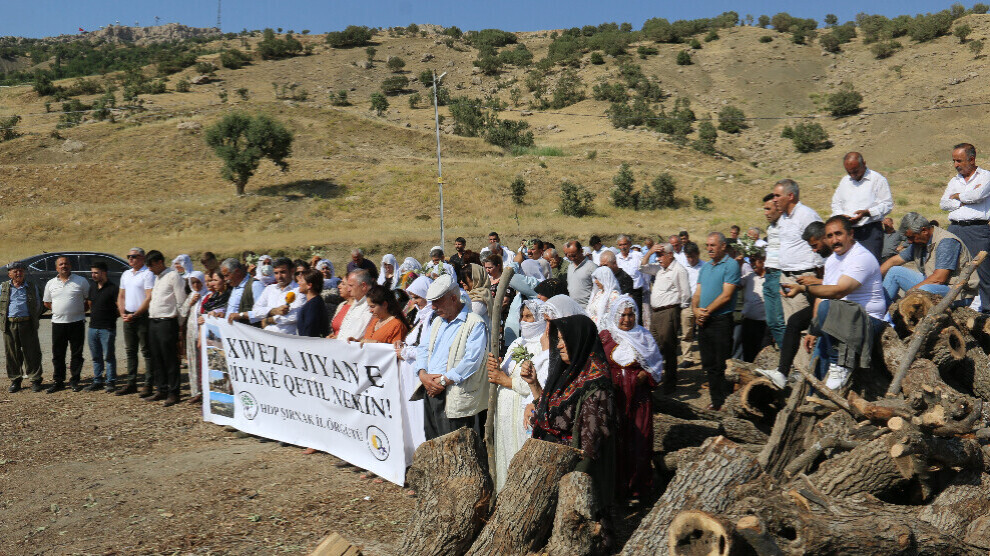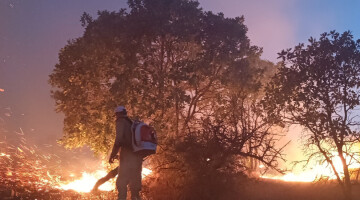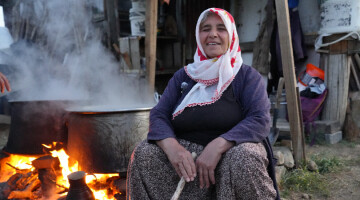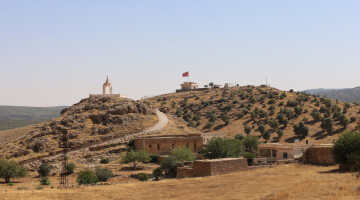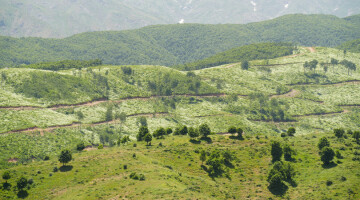Politicians from the HDP and DBP and activists from the women's movement TJA protested in the province of Şırnak against state-ordered over-exploitation in Kurdistan. The environment is being massively damaged by mining, dams, hydroelectric power plants, sand pits and arson by the Turkish military. In addition to forest fires, massive destruction operations are taking place in the mountainous regions of Cudi, Gabar and Besta for "security reasons". The mountain landscapes with their unique nature are thus being transformed into a desert.
To protest against this, the Kurdish politicians and activists made a statement at the foothills of Nimêjê (tr. Namaz). This is the place where the felled trees are collected and taken away. "Xweza jiyan e, jiyanê qetil nekin!" ("Nature is life, do not kill life!") was written in Kurdish on a banner that was rolled out.
"Enmity against nature and culture in Kurdistan"
HDP MP Nuran Imir said that the forests in the region have been systematically destroyed for two years. A special war has been taking place in Kurdistan for forty years, she said, and the destruction is part of the war concept. For a long time, the culture, language and identity of the Kurdish people have been under attack, she said, adding: "This hostility against our people is now also being practised against nature, as the mountains and forests are being destroyed. The fact that there is silence about this is because we are in Kurdistan."
While environmental destruction is widely heard in western Turkey, the destruction of nature in northern Kurdistan reigns supreme. The Şırnak Bar Association recently made a desperate appeal to the World Wildlife Fund (WWF), the Foundation for the Protection and Promotion of Environmental and Cultural Values (ÇEKÜL) and Greenpeace to motivate them to take action against this environmental destruction. Greenpeace rejected the request, stating that the issue did not fall within the organisation's area of expertise.
The HDP parliamentary group has raised the issue several times in the Turkish parliament, and a total of 25 questions have been asked about it. But the government does not consider itself responsible either. According to Imir, none of the questions has been answered. "We will continue to demand accountability and will not remain silent. A massacre of nature is taking place here," said the HDP MP.
Speaking after, DBP co-chair Saliha Aydeniz said: "What has not been achieved through years of displacement and burning in Kurdistan is now to be enforced through destruction. This region is wanted depopulated, and the people deprived of their identity. The government boasts about the construction of multi-lane roads, but these roads are used for the looting of Kurdistan. Nature is being hawked to government supporters. The cleared areas are declared mining areas and sacrificed for profit. The Kurdish people are standing up for their culture, language and roots, they are resisting the looting and massacres."
Aydeniz appealed to the ecology movement: "The exploitation of Kurdistan is part of the war policy, which is directed against the people's demand for self-determination. No one must remain silent about this plunder. Those who remain silent agree to this policy. Therefore, ecological circles must also turn to Kurdistan. The policy conducted here is causing a crisis for the peoples of Turkey. As long as the war policy continues, the economic, political and social crisis will continue to worsen."

